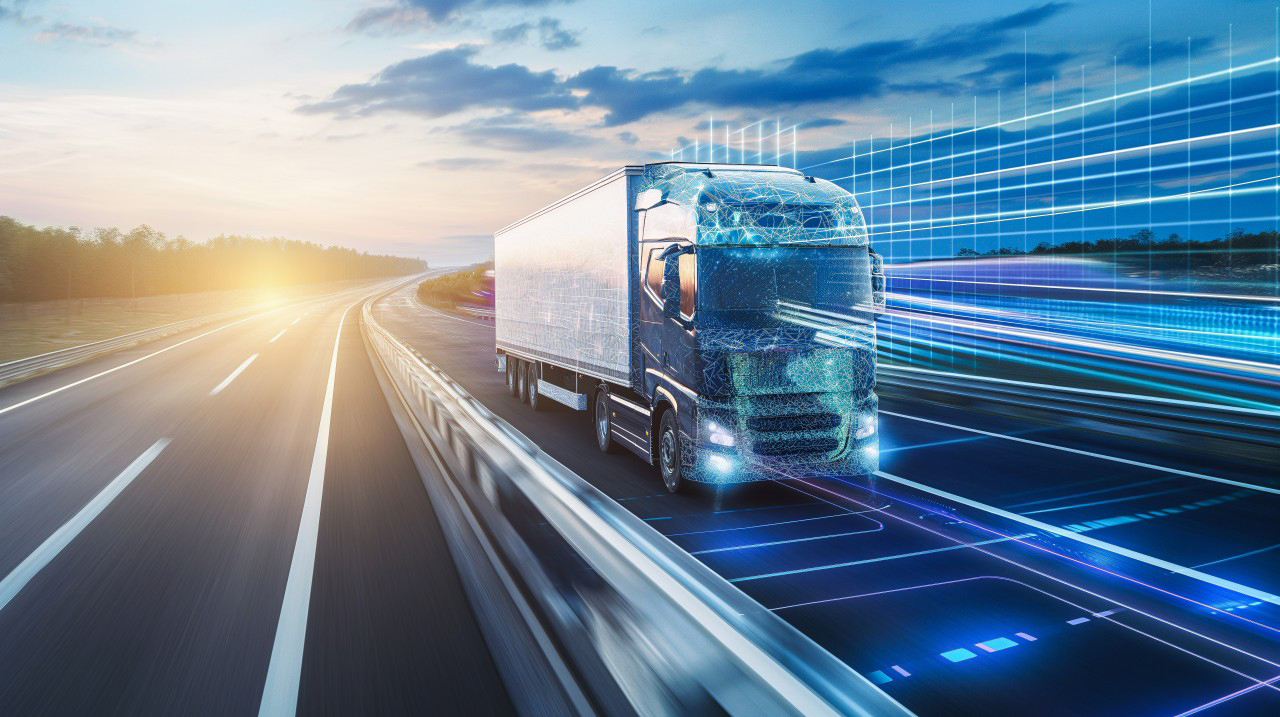
Susie Jones
Umetna inteligenca in njen vpliv na trajnost v tovornem prometu
Ustvarjeno: 29. 08. 2024
•
Posodobljeno: 29. 08. 2024
Umetna inteligenca (UI) je izraz, ki je v zadnjih letih postal del sodobnega besednjaka. Zaradi pomanjkljivega razumevanja in napačnih predstav se pogosto dojema negativno. Kljub zadržkom lahko umetna inteligenca pozitivno vpliva na trajnost, delovne procese in gospodarstvo. Glede na to, da več kot 25 % emisij CO2 proizvede prometna industrija, lahko UI prispeva k pozitivnim spremembam za trajnostno prihodnost?
Kaj je umetna inteligenca?
Po podatkih Oxford Languages je umetna inteligenca:
"teorija in razvoj računalniških sistemov, ki so sposobni opravljati naloge, za katere je običajno potrebna človeška inteligenca, kot so vizualno zaznavanje, prepoznavanje govora, odločanje in prevajanje med jeziki. "
Trajnost v panogi tovornega prometa
Industrija je na kritičnem razpotju, saj se zahteve povečujejo, vrste dostave pa spreminjajo - med najhitreje rastočimi zahtevami je spletno nakupovanje. Medtem ko lahko povečano povpraševanje tovornemu prometu koristi, se ta sooča z okoljsko dilemo, ki ključno vpliva na planet.
Industrija vpliva na okolje na naslednje načine:
Onesnaževanje s hrupom: Tovornjaki v velikem številu lahko prispevajo k onesnaževanju s hrupom. Onesnaževanje s hrupom moti mestna in podeželska območja ter pogosto vpliva na dobro počutje prebivalcev in divjih živali. Izpostavljenost visokim ravnem hrupa lahko povzroči stres in težave s srcem in ožiljem.
Emisije ogljika: Tradicionalna goriva v tovornjakih sproščajo CO2 v ozračje. Od vseh svetovnih emisij v prometu jih 29 % izhaja iz tovornega prometa.
Kakovost zraka: Tovornjaki izpuščajo dušikove okside in trdne delce, ki slabšajo kakovost zraka, škodujejo okolju in povzročajo težave z dihali pri ljudeh.
Kako lahko umetna inteligenca izboljša trajnost
Načrtovanje poti: Neustrezno načrtovanje poti lahko vozni park stane denarja, časa in virov. UI lahko natančno predvidi potrebe in zahteve ter priporoči najbolj trajnostno pot. Njeni algoritmi lahko analizirajo prometne vzorce, vremenske razmere in učinkovitost porabe goriva ter tako optimizirajo dostavne poti. Ta postopek prihrani denar in prispeva k zmanjšanju emisij ogljikovega dioksida.
Napovedovanje povpraševanja potrošnikov: Izdelki se pogosto pošljejo potrošniku, vendar se ne zahtevajo, kar povzroča izgubo virov in velik vpliv na okolje. Strojno učenje z umetno inteligenco in napovedna analiza bosta proizvajalcem pomagala pri predvidevanju povpraševanja, racionalizaciji dobave in optimizaciji proizvodnih procesov. S smiselnim vpogledom v dostavo in neprevzem blaga lahko umetna inteligenca logistična podjetja obvesti o tem, katero blago je treba poslati - okoljske težave se rešujejo že pri izvoru.
Spremljanje voznika: Algoritmi umetne inteligence analizirajo voznikove vzorce, kot so prekoračitev hitrosti, sunkovito zaviranje in prosti tek. Na podlagi tega lahko umetna inteligenca zagotovi svetovanje in spodbude za varčnejšo vožnjo.
Zmanjšanje porabe energije: Umetna inteligenca lahko podjetjem, ki upravljajo vozne parke, pomaga pri upravljanju energije v dobavnih verigah. Ugotavlja lahko neučinkovita področja in zagotavlja strategije za optimizacijo, vključno z analizo podatkov iz pametnih števcev, senzorjev in drugih naprav, da ugotovi, kaj porablja preveč energije.
Ali bo umetna inteligenca prevzela logistično industrijo?
Čeprav bo uporaba umetne inteligence igrala pomembno vlogo v logistični industriji, je malo verjetno, da jo bo popolnoma prevzela. Algoritmi umetne inteligence ne morejo upoštevati spontanih dogodkov in izjem - zato bo človek še vedno igral ključno vlogo. Karierne priložnosti v panogi tovornega prometa bodo še vedno na voljo, vendar bodo videti bistveno drugače.
Kako lahko industrija še zmanjša emisije ogljika?
Industrija lahko sprejme naslednje ukrepe:
Vozila z nizkimi emisijami: Električna in hibridna težka tovorna vozila lahko zmanjšajo emisije ogljika. Oboje je primerno za prevoz na kratke in dolge razdalje.
Alternativna goriva: Zaradi bližajočega se leta 2050, ko je neto ničelna vrednost nič, se energetska zakonodaja usmerja v čistejše alternativne vire. S hidrotretiranim rastlinskim oljem (HVO) se lahko emisije zmanjšajo takoj in znatno. Podjetje Certas Energy HVO podpira prehod na čistejšo alternativo in pomaga podjetjem pri izpolnjevanju njihovih trajnostnih ciljev ter sprejemanju pomembnih ukrepov za doseganje njihove prihodnosti brez neto ničelne vrednosti. HVO zagotavlja naslednje prednosti:
Takojšnje zmanjšanje emisij toplogrednih plinov do 90 % v primerjavi s standardnim dizelskim gorivom v celotnem življenjskem ciklu izdelka.
Manj dušikovih oksidov kot standardno dizelsko gorivo
Manj trdnih delcev kot pri standardnem dizelskem motorju.
Lahko biološko razgradljiv
Dolg rok trajanja do 10 let
Praktično brez FAME
Alternativno dizelsko gorivo - ni potrebna nobena sprememba motorja ali infrastrukture.
Učinkovitost vozila: Učinkovitost lahko izboljšajo motorji, ki varčujejo z gorivom, krajši čas prostega teka in redno vzdrževanje.
Pametna embalaža: Proizvajalci lahko pri pošiljanju izdelkov uporabljajo biološko razgradljive in reciklirane materiale, kar zmanjšuje količino odpadkov in znižuje stroške. Poleg tega bo lažja embalaža izboljšala učinkovitost in zmanjšala emisije ogljika.
Obnovljivi viri energije: Uporaba obnovljivih virov energije, kot sta sončna ali vetrna energija, lahko bistveno zmanjša emisije ogljika.
Zmanjšajte število obvoznih kilometrov: račun SNAP omogoča upravljavcem voznih parkov, da zmanjšajo število obvoznih kilometrov - z več kot 600 storitvenimi partnerji, ki so na voljo strankam računa SNAP, se na vaši poti zagotovo najde kakšen postanek.


